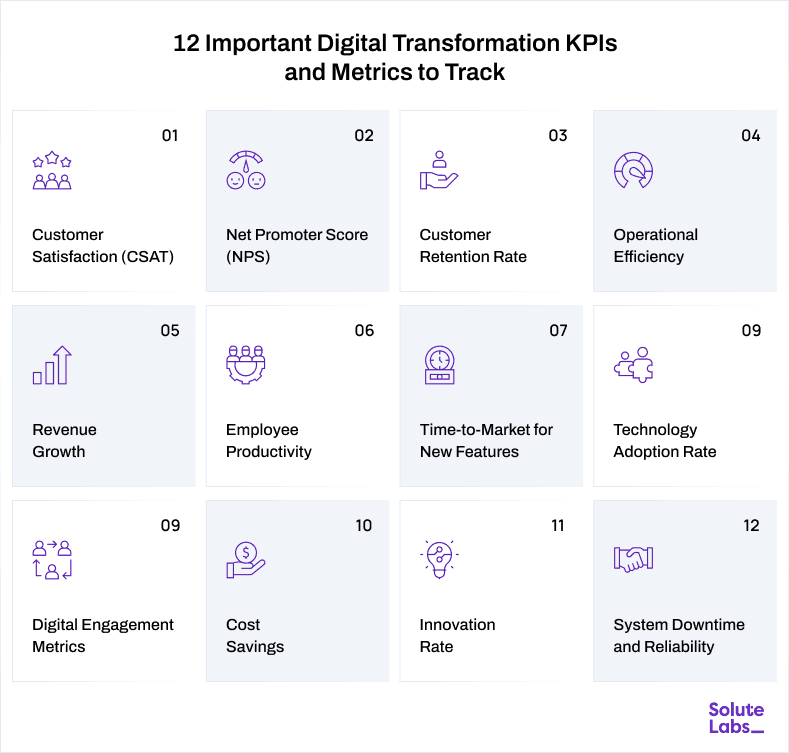Over the last 30 years, digital transformation has grown in importance as a prerequisite for company success. If businesses want to remain ahead of the competition, they must adapt to new technologies as they emerge.
Consumers have ever-increasing expectations for a company's digital capabilities, and the metrics they use to gauge performance are becoming sharper and more accurate.
Therefore, dynamic aspects like market circumstances, corporate development, and technology innovation must be taken into account by a firm's key performance indicators (KPIs). Because of this, the KPIs that businesses previously used are most likely not practical for gauging the success of their digital transformation.
The ways digital transformation is measured are also continuously changing. The numbers that indicated your success in 2020 may not reveal the current state of your digital transformation journey in 2025.
Knowing the right digital transformation KPIs and metrics to track is absolutely vital. These metrics are the guideposts that let you know whether your digital journey is on the right path. Let's consider some critical metrics that need to be measured and discuss how to identify which KPIs you and your team have to track on your digital transformation journey.

Overview of Digital Transformation
Digital transformation is the process of integrating digital technology into all aspects of an organization, significantly altering how it runs and provides value to consumers. It's more than simply implementing new technology. It is a transformation in thinking and strategy that allows businesses to become more nimble, efficient, and customer-focused. Businesses may use digital transformation to boost internal processes, improve customer experiences, and remain competitive in an increasingly tech-driven environment. To measure the effectiveness of these initiatives, digital transformation KPIs are important, since they provide a clear picture of progress and opportunities for development.
Better Process Automation
One of the key drivers of digital transformation is the automation of repetitive processes. This lowers human mistakes, speeds up processes, and allows personnel to concentrate on more important tasks.
Enhanced Customer Experience
Digital transformation enables organizations to give more customized, efficient, and seamless experiences to their consumers. This includes enhanced customer service, quicker response times, and easier access to information.
Data-Driven Decision Making
Businesses may make more informed choices by employing modern data analytics. Real-time data gathering and analysis improve the accuracy with which trends are identified, performance is tracked, and future results are predicted.
Increased Collaboration and Communication
Digital technologies improve cooperation across teams, departments, and even worldwide offices. Businesses can operate more closely together, regardless of location, thanks to cloud-based platforms and collaboration tools.
Good Agility and Flexibility
Digital transformation enables firms to respond swiftly to market developments and consumer requirements. Companies may introduce new goods, change strategy, and execute changes more quickly.
Great Innovation and Competitive Advantage
At its core, digital transformation drives firms to innovate continuously. Companies that embrace the latest technology may remain ahead of the competition and consistently provide superior value to their consumers.
How to Measure Digital Transformation Progress?
To ensure the success of your digital transformation, it's important to track the right metrics. By focusing on key areas such as customer experience, operational efficiency, and business impact, you can assess whether your digital initiatives are driving value and achieving goals. Here's how to measure success:
- Key Performance Indicators (KPIs): KPIs for digital transformation help track progress across various areas, such as customer acquisition, operational performance, and overall business impact, allowing you to align your goals with measurable outcomes.
- Customer Experience Metrics: Measuring customer satisfaction through NPS, customer feedback, and user engagement helps assess how well your digital initiatives are improving the customer experience and meeting their expectations.
- Operational Efficiency: Digital transformation metrics such as cost reduction, automation, and process speed are key indicators of how effectively your business operations have improved since adopting digital technologies.
- Business Transformation Metrics: These metrics focus on the broader impact of digital transformation on business goals, including market share, growth in revenue streams, and overall business agility.
- Information Technology Metrics: How to measure the success of digital transformation can also involve tracking the performance of your IT infrastructure, such as system uptime, scalability, and security, to ensure your systems are resilient and efficient.
- Digital Product Metrics: Tracking user engagement, product usage, and feature adoption can help evaluate how well your product is performing post-transformation, ensuring your digital products are delivering value to users.
By regularly reviewing these KPIs for digital transformation, you can track your progress, make necessary adjustments, and ensure your digital transformation efforts are aligned with your long-term business objectives.
12 Important Digital Transformation KPIs and Metrics to Track

Digital transformation is a continuous journey, and measuring its success is essential to ensuring it delivers the expected outcomes. By tracking key performance indicators (KPIs) and metrics, businesses can gain valuable insights into their progress, identify areas for improvement, and adjust their strategies accordingly. Here are 12 crucial digital transformation KPIs and metrics every business should track:
Customer Satisfaction (CSAT)
One of the primary goals of digital transformation is enhancing customer experience. Tracking digital KPIs such as CSAT helps measure how satisfied customers are with your digital products and services, providing direct insights into their experience.
Net Promoter Score (NPS)
KPI digital metrics like NPS track customer loyalty and satisfaction. A high NPS indicates that your customers are likely to recommend your product to others, which is a sign of successful digital transformation.
Customer Retention Rate
As your business evolves digitally, tracking customer retention is vital. This metric helps you assess whether your digital transformation efforts are leading to long-term customer loyalty and engagement.
Operational Efficiency
How to measure digitalization in a corporation often revolves around tracking operational efficiency. Key metrics include cost reduction, time savings, and improved workflow automation, showing the direct impact of digital transformation on your operations.
Revenue Growth
One of the most important digital transformation KPIs is revenue growth. This metric helps measure the financial impact of your digital initiatives, showing whether your transformation is driving new revenue streams or improving existing ones.
Employee Productivity
Digital teams' measurement involves assessing how digital tools and processes are improving employee performance. Tracking employee productivity metrics, such as task completion time and collaboration efficiency, can highlight the effectiveness of digital tools in supporting your team.
Time-to-Market for New Features
The speed at which you develop and deploy new features is a key measure of digital transformation success. By tracking this metric, you can assess how well digital tools and automation are accelerating product development.
Technology Adoption Rate
Tracking the adoption of new technologies across the organization is critical. The higher the adoption rate, the more successful your digital transformation efforts are in integrating technology throughout your business.
Digital Engagement Metrics
For customer-facing digital products, tracking engagement metrics such as user activity, session duration, and feature usage can provide insights into how effectively your digital platforms are meeting customer needs.
Cost Savings
IT department metrics often focus on cost savings achieved through digital transformation, such as reduced infrastructure costs, lower operational overhead, and fewer manual interventions, directly impacting profitability.
Innovation Rate
Technology KPIs like innovation rate measure how quickly your company can innovate and deliver new digital products or solutions. This is a direct indicator of how agile your digital transformation is and how well it supports business growth.
System Downtime and Reliability
The stability of your IT infrastructure is essential for successful digital transformation. Tracking system uptime, maintenance schedules, and reliability in your IT department metrics ensure that digital tools are available and performing as expected.
By tracking these digital transformation KPIs, businesses can gain comprehensive visibility into the effectiveness of their transformation efforts. These metrics provide actionable insights into how technology is reshaping your operations, improving customer experiences, and driving business growth.
Suggested Read
How Cloud Adoption Accelerates Enterprise Digital Transformation?
View Blog
Choosing the Right KPIs for Digital Transformation
Selecting the right KPI for digital transformation is crucial for avoiding confusion and focusing efforts effectively. Avoid general lists, and then pick out KPIs that support your business's objectives. Choose those KPIs that are meaningful and could be acted upon; such factors should be relevant, measurable, and impactful. The following are some best practices for developing and choosing the right KPIs for your digital transformation:
- Select a KPI that is easily measurable and comprehensible to non-IT personnel.
- Define the target audience for the KPI to ensure its relevance and applicability.
- Clearly outline the desired business outcome or benefit associated with the chosen KPI.
- Consider the current status of the team or organization and set achievable target goals.
- Ensure that the selected KPI is attainable and doesn't overwhelm the team, avoiding setting unrealistic expectations or potential failure.

Accelerate the Digital Transformation of Your Business
Driving digital transformation initiatives with SoluteLabs is a collaborative and strategic process. Here's how we can help you in your digital transformation journey:
Comprehensive Strategy Development:
SoluteLabs works closely with your organization to understand your goals, challenges, and vision for digital transformation. We help you to develop a tailored strategy that aligns with your business objectives, technology landscape, and industry trends. This strategy encompasses areas such as technology selection, process optimization, and change management.
Technology Expertise:
We have extensive expertise in cutting-edge technologies and platforms that drive digital transformation. Our team of skilled professionals is well-versed in areas like Product discovery, UI/UX design, DevOps, Digital Transformation and more. We can guide you in selecting and implementing the right technologies to optimize processes, enhance customer experiences, and drive innovation.
Agile Development Approach:
We follow an agile development methodology, enabling iterative and incremental development. This approach ensures flexibility, adaptability, and a faster time to market for digital solutions. It allows you to see tangible results at regular intervals and provides opportunities for feedback and refinement throughout the development process.
User-Centric Design:
SoluteLabs places a strong emphasis on user-centric design principles. They conduct user research, usability testing, and UX/UI design to create intuitive and engaging digital experiences. By understanding user needs and preferences, we ensure that your digital transformation initiatives deliver seamless and delightful user experiences.
Collaborative Partnership:
We believe in fostering a collaborative partnership with our clients. We work closely with your team, maintaining open communication channels and involving stakeholders at every stage of the project. This collaborative approach ensures transparency, shared ownership, and successful project delivery.
Continuous Support and Maintenance:
We provide ongoing support and maintenance services to ensure the smooth operation of your digital solutions. We offer monitoring, performance optimization, bug fixing, and feature enhancements to keep your systems up-to-date and aligned with evolving business needs.
Conclusion
Tracking the right digital transformation KPIs and metrics is crucial for organizations to assess their progress and measure the success of their digital initiatives in 2025. By focusing on all the above-mentioned KPIs and metrics, businesses can gain valuable insights and make informed decisions to drive their digital transformation journey.
If you're looking for expert guidance and support in digital transformation for your business, at SoluteLabs we offer comprehensive digital transformation services. Our team of experienced professionals can help your organization develop and execute a tailored digital transformation strategy, leveraging the latest technologies and best practices.
